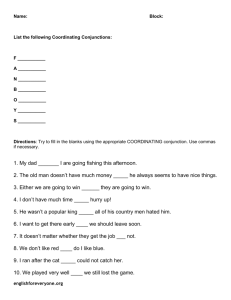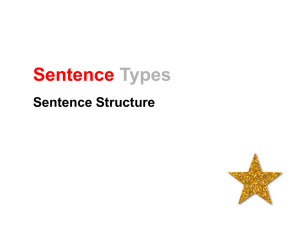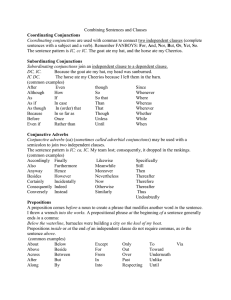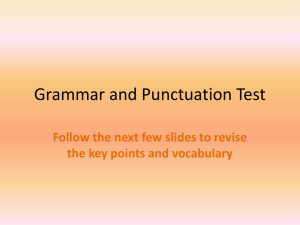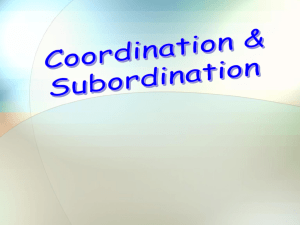Subordinating conjunction
advertisement
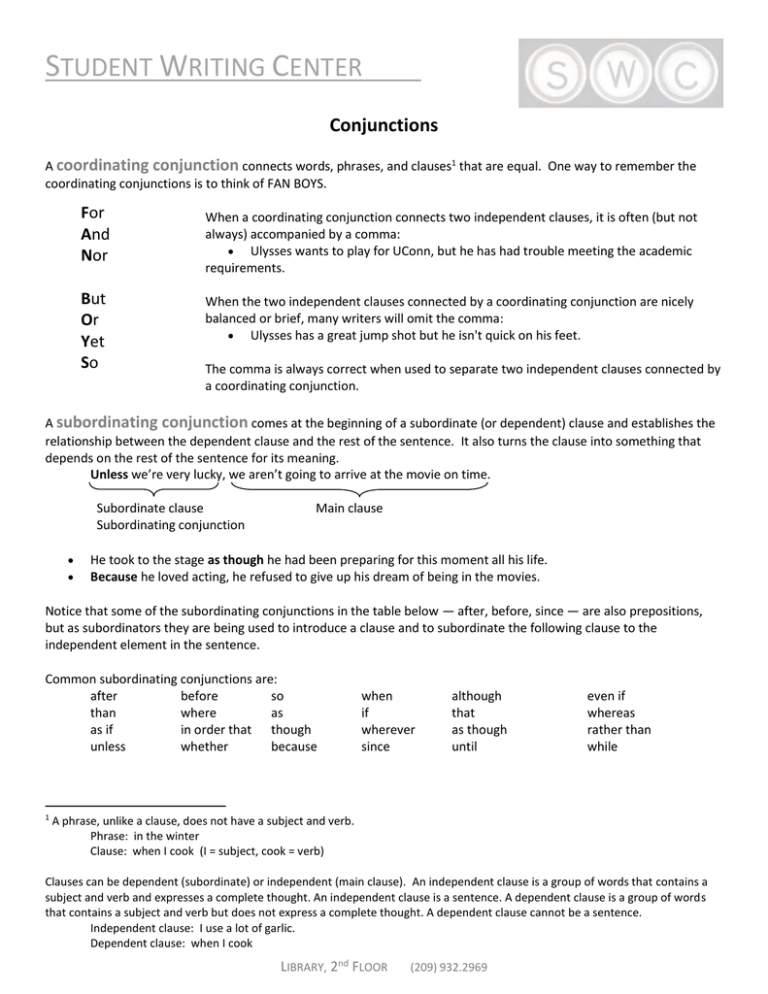
STUDENT WRITING CENTER Conjunctions A coordinating conjunction connects words, phrases, and clauses1 that are equal. One way to remember the coordinating conjunctions is to think of FAN BOYS. For And Nor When a coordinating conjunction connects two independent clauses, it is often (but not always) accompanied by a comma: Ulysses wants to play for UConn, but he has had trouble meeting the academic requirements. But Or Yet So When the two independent clauses connected by a coordinating conjunction are nicely balanced or brief, many writers will omit the comma: Ulysses has a great jump shot but he isn't quick on his feet. The comma is always correct when used to separate two independent clauses connected by a coordinating conjunction. A subordinating conjunction comes at the beginning of a subordinate (or dependent) clause and establishes the relationship between the dependent clause and the rest of the sentence. It also turns the clause into something that depends on the rest of the sentence for its meaning. Unless we’re very lucky, we aren’t going to arrive at the movie on time. Subordinate clause Subordinating conjunction Main clause He took to the stage as though he had been preparing for this moment all his life. Because he loved acting, he refused to give up his dream of being in the movies. Notice that some of the subordinating conjunctions in the table below — after, before, since — are also prepositions, but as subordinators they are being used to introduce a clause and to subordinate the following clause to the independent element in the sentence. Common subordinating conjunctions are: after before so than where as as if in order that though unless whether because 1 when if wherever since although that as though until even if whereas rather than while A phrase, unlike a clause, does not have a subject and verb. Phrase: in the winter Clause: when I cook (I = subject, cook = verb) Clauses can be dependent (subordinate) or independent (main clause). An independent clause is a group of words that contains a subject and verb and expresses a complete thought. An independent clause is a sentence. A dependent clause is a group of words that contains a subject and verb but does not express a complete thought. A dependent clause cannot be a sentence. Independent clause: I use a lot of garlic. Dependent clause: when I cook LIBRARY, 2nd FLOOR (209) 932.2969 Some conjunctions combine with other words to form what are called correlative conjunctions. They always travel in pairs, joining various sentence elements that should be treated as grammatically equal. She led the team not only in statistics but also by virtue of her enthusiasm. Polonius said, "Neither a borrower nor a lender be." Whether you win this race or lose it doesn't matter as long as you do your best. Examples of correlative conjunctions: both. . .and not only. . .but also not. . .but either. . .or neither. . .nor whether. . .or as. . .as Conjunctive adverbs (also transitions or adverbial conjunctions) such as however, moreover, nevertheless, consequently, as a result are used to create complex relationships between ideas. addition again, also, and, and then, besides, equally important, finally, first, further, furthermore, in addition, in the first place, last, moreover, next, second, still, too comparison also, in the same way, likewise, similarly concession granted, naturally, of course contrast although, and yet, at the same time, but at the same time, despite that, even so, even though, for all that, however, in contrast, in spite of, instead, nevertheless, notwithstanding, on the contrary, on the other hand, otherwise, regardless, still, though, yet emphasis certainly, indeed, in fact, of course example or illustration after all, as an illustration, even, for example, for instance, in conclusion, indeed, in fact, in other words, in short, it is true, of course, namely, specifically, that is, to illustrate, thus, truly summary all in all, altogether, as has been said, finally, in brief, in conclusion, in other words, in particular, in short, in simpler terms, in summary, on the whole, that is, therefore, to put it differently, to summarize time sequence after a while, afterward, again, also, and then, as long as, at last, at length, at that time, before, besides, earlier, eventually, finally, formerly, further, furthermore, in addition, in the first place, in the past, last, lately, meanwhile, moreover, next, now, presently, second, shortly, simultaneously, since, so far, soon, still, subsequently, then, thereafter, too, until, until now, when Adapted from The Guide to Grammar and Writing | http://grammar.ccc.commnet.edu/grammar/conjunctions.htm LIBRARY, 2nd FLOOR (209) 932.2969
